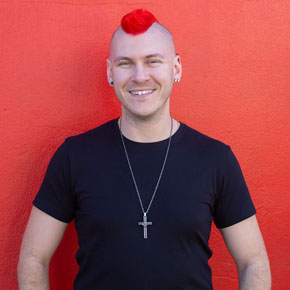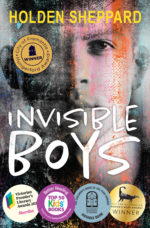Holden Sheppard – City of Fremantle T.A.G. Hungerford Award Winner 2018

Read an interview with City of Fremantle T.A.G Hungerford Award winner Holden Sheppard and an extract from his novel Invisible Boys.
Describe your manuscript in your own words.
Invisible Boys is a raw, confronting YA novel, tackling homosexuality, masculinity, anger and suicide with a nuanced and unique perspective. Set in regional Western Australia, the novel follows three sixteen-year-old boys in the throes of coming to terms with their homosexuality in a town where it is invisible – and so are they. Invisible Boys depicts the complexities and trauma of rural gay identity with painful honesty, devastating consequence and, ultimately, hope.
What inspired you to write it?
Invisible Boys is pure fiction, but it was born of the trauma of my own adolescence. Much of what is in the novel springs from the emotional truths underlying my life, but writing those emotions into a fictional story gave me permission to explore stuff that I otherwise wouldn’t have the courage to talk about in public. This includes elements of the gay teenage experience that are disturbing, exciting, embarrassing and graphic. The novel also stares down the barrel of male mental health and suicide, and it was important for me to be unflinching and unfettered when dealing with these topics.
Ultimately, I wrote this novel for anyone who has struggled, or still is. I want the pain of these characters to be visible to the world. I want the world to understand that boys and men suffer, and for gay boys in particular, even in 2018, this struggle can feel like the end of the world, but it isn’t.
How long have you been working on it?
There was something extremely urgent about Invisible Boys, which tells me I was really overdue to tell this story. I feel less like I wrote it and more like it came screaming out of me, with the roar of a V8 engine and a willingness to smash through any barricade put in its path. I wrote the first draft in two months. Within six months, I had completed a polished third draft, and that’s what I submitted to the Hungerford. It was an intense but cathartic ride, from beginning to end.
What does it mean to you to make the shortlist of the 2018 City of Fremantle T.A.G. Hungerford Awards?
When I found out I’d made the Hungerford shortlist, it was so surreal that I started to doubt whether the phone call had even happened at all. This is a bit embarrassing, but when the confirmation email came through, I kept opening and re-reading it from beginning to end for about two days. I must have read it twenty times, just to reassure myself it was truly happening, that it was actually addressed to me, that they hadn’t made some mistake. Once I was convinced I wasn’t living in Bizarro World, I was absolutely stoked.
Making the shortlist means so much to me on two fronts. Firstly, when I was sixteen and growing up gay in country WA, I felt truly unseen, and for a long time I thought I would take all of what I went through to the grave. So the idea that a publisher wants to hear – and share – this story is really overwhelming. After everything we went through getting marriage equality across the line, it is so exciting to see the conversations now shift from fighting for our rights to people being genuinely curious and empathetic about our lives and our experiences.
Secondly, as a writer from a blue-collar background in Geraldton, the idea of being shortlisted for something as prestigious and well-known as the T.A.G. Hungerford Award is absolutely mental. If you told the teenage me that this would happen one day, I absolutely would not believe you. It is the kind of validation every writer hopes for, and I am truly grateful to the judges that they thought my novel was good enough for the shortlist. Thank you so much to Fremantle Press and the City of Fremantle for making something like this possible for debut WA authors like myself – it is a real honour.
From Invisible Boys by Holden Sheppard
I keep watch for a long time on the wharf, but nothing happens and there’s no sign of life anywhere. The sea breeze picks up a little, but it’s not too cold: if anything, it’s refreshing, with a night as balmy as this one.
By eight o’clock, I’m completely bored and I lose interest in watching the wharf. I lay down on the wooden table, which is as uncomfortable as it sounds, and stare up at the studded mural of black and silver in the sky above me.
When I was little, my dad taught me how to spot Orion’s Belt, though everyone else I know calls it the Saucepan. I can still find it so easily. Dad was so smart. People used to say I was just like him. He was obsessed with Greek legends and used to read them to me, though I was never as interested in them as I am these days. I think he said something about Orion getting blinded and having to travel to get his sight back, or maybe that was Homer.
The one thing I do remember is what he told me about how significant Orion was.
‘Orion was a hunter, which means he was a mortal,’ Dad used to say. ‘And yet, look up there. The Greeks found a way to place a mortal up in the heavens, and now, two thousand years later, you and me are staring up at the sky and talking about him. Proves anyone can make it to the stars, doesn’t it?’
I always took that to heart. Anyone, from anywhere, could make it to the stars. It even made me join a band.
I miss Dad so much.
As I gaze up at Orion, I see a flash of light. A shooting star, surely – but my eye is too slow to catch it.
But then another flash comes, and as I shift on the table, I realise it’s a pair of yellow headlights cruising into the car park in the shadows of the silos.
I sit bolt upright. A sedan has chugged into the car park. It sounds unhealthy: spluttering and diseased. It’s got a square shape that tells me it’s really old – maybe from the 80s, if any cars as old as that are still running. There’s only one silhouette – in the driver’s seat.
The car shudders to a stop. Freezes. Lights out.
I’m transfixed for minutes. The driver doesn’t get out. There’s no greasy aroma of take-away burger wrappers, no rustle of a map or the glow of a satnav, no vermilion ember or plume of cigarette smoke from a rolled-down window.
This guy just parked at the wharf in the cover of night for no apparent reason.
Or did he park here for the most apparent reason of all?
I flick the disposable cigarette lighter I got from the deli before and produce a little flame. I see the silhouette in the driver’s seat twitch, but no movement. I spark up a few more times. Nothing. The flash of flame starts to imprint on my retina and I can’t tell anymore whether the driver is looking at me or not.
A surge of excitement bubbles within me. I want to know if he’s here for the same reason I am. How far did he drive to get to the wharf tonight? What happened to make this the best option for him? What excites me is the prospect of another me. I feel like a lonely iron filing who finally found his first ever magnet.
I leave Hannah’s bike against the picnic table, slip my hands in my pockets and casually saunter between the bonnet of the sedan and the entrance to the wharf.
‘Dammit,’ I mutter to myself, as I pass the car. I was so focused on looking casual and not overtly cruisy that I forgot to check if he was checking me out.
I reach a blackboy surrounded by white pebbles, round it as if this was all premeditated, and sidle past the front of his bonnet again, this time keeping my eyes trained on the silhouette.
He moves.
His squared jaw follows my movements like the arrow on a compass.
And as I pass by the driver’s side, he flashes his headlights, my pale legs briefly illuminated in his path.
It’s on.



